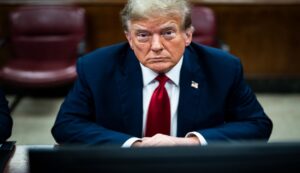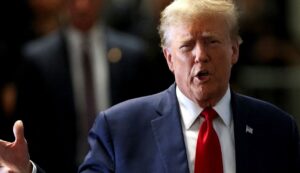Do the polls not reflect the true level of support for Donald Trump in November?
Election Day in U.S : Republicans are hoping that surveys indicating a deadlocked presidential contest do not accurately represent the amount of support that Donald Trump will really get in November.

According to pollsters tracking the 2024 presidential race, the former president outperformed his polling numbers on Election Day in both 2016 and 2020, but his chances of doing so again this year are lower because polls are now better at capturing likely Trump supporters who were previously undercounted.
Cliff Young, the CEO of Ipsos polling, said that “many pollsters today are using past vote [history] to correct for the Trump undercount.”
According to Young and other pollsters, they have made various additional adjustments to their technique to ensure that they accurately represent a cross-section of Republican and Democratic voters.
Increasingly, polls are using voter registration databases to get their sample data rather than random lists of phone numbers.
Systems for registration-based sampling provide more precise information on the residences of respondents. According to Charles Franklin, the director of the Marquette Law School Poll in Wisconsin, the method makes it simpler to weight the data to make sure that Trump-favoring rural and other right-leaning regions aren’t underrepresented in the findings.
Another significant shift in polling has been that throughout the last two election cycles, surveyors have often weighted their findings according to education to ensure that they correctly represent Trump-leaning non-college educated voters.
For the most of the year, Trump had a lead in surveys against Vice President Joe Biden, who withdrew from the race in July and was replaced by Kamala Harris. In most national and battleground state surveys, Trump and Harris are now tied or behind one other.
With two months left in the race, Trump campaign spokesman Steven Cheung said in response to a request for comment that the former president was “dominating” in surveys.
“Polling shows President Trump is dominating both nationally and in the battleground states because voters want a return to pro-America policies that actually work,” Cheung told Newsweek.
The majority of the discussion over Trump’s impact on polls has its roots in the 2016 election. Those without college degrees were consistently undercounted by pollsters that year, a mistake that caused most polls to suggest that Trump was losing Democratic opponent Hillary Clinton by many percentage points.
In the Blue Wall battleground states of Pennsylvania, Wisconsin, and Michigan, where Clinton had a comfortable lead up until Election Day, there was the largest undercount of Trump voters in 2016.
According to a Marquette Law School Poll research, between the beginning of September and the final day of the campaign, 133 surveys were conducted in the three Blue Wall states, and Trump only led in one of them.
Trump won all three of the states on election night, and his unexpected victories contributed to his Electoral College triumph. National exit surveys showed that among voters without college degrees, he received a majority of the vote.
The effort on education by the political polling business in 2020 ensured that most surveys were more accurate than they had been four years before.
However, Trump still won more votes in 2020 than predicted by pollsters, adding credence to the widespread belief that millions of so-called “shy Trump voters” exist in the nation who withhold their support for him from pollsters.
Polling experts mainly reject the hypothesis, arguing that it’s hard to know from surveys whether those who say they’re not supporting Trump are telling the truth or are just unsure about who they would vote for.
Young said, “This is a problem on the margins,” adding that the bigger issue is attempting to convey the emotion of potential Trump supporters who are not regular voters.
It will still be harder to convince prospective Trump supporters to be honest in 2024 than it will be to get them to respond at all, according to Franklin.

“People who support Trump are mostly quite distrustful of the news media and other institutions, and that includes pollsters,” Franklin added. It’s not like they declare during the [poll] interview that they won’t vote for Trump but end up doing so. It’s that they refuse to conduct the interview in the first place.”
According to pollsters, Trump seems to be directly responsible for the problem since he attracted people to the polls in 2016 and 2020 who had not cast regular ballots in previous presidential elections. When Trump was not running for office in the 2018 and 2022 midterm elections, polls were more accurate.
With Trump back on the ballot, it will be interesting to see whether pollsters can still get it right.
“Pollsters certainly have made changes to how we do polls to try to reduce this problem,” Franklin added. “Whether they work, we won’t know till early November.”
Republican strategist Sam Chen, whose company also does some polling, said Republicans shouldn’t write off the polls this time around or think that the quiet Trump voter effect would swing the race. Chen is headquartered in Pennsylvania.
“The Republican Party erred in 2020 when it believed that the quiet [Trump] majority would remain silent. Actually, they had previously voiced their opinions,” Chen said. “I don’t think the Trump vote is being undercounted as much as it used to be.”